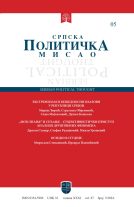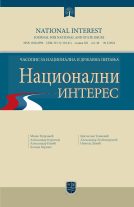- Home page
- Researchers
- Dragana Lj. Mitrović
Dragana Lj. Mitrović
Centra za balkanske studije, Niš

THE ROLE OF THE KNOWLEDGE ELITE IN THE DEVELOPMENT OF CROSS-BORDER COOPERATION AND THE CULTURE OF PEACE IN THE BALKANS
The contemporary Balkans are still an area of unfinished peace. Its pacification and development depend on a faster process of regionalization and globalization, but also on changing the transition strategy and opening up to the elites of knowledge as actors in the economic, social, and cultural development of the countries of this region. Current flows in the European integration process are predominantly dictated by geostrategic interests but not by development goals. The paper discusses the actors of cross-border cooperation in the Balkans, with special reference to the role of the knowledge elite and the new diaspora in regional development and the affirmation of the culture of peace in this fragile geopolitical space. The focus is on the problematization of the thesis on the role of the new intellectual diaspora from the Balkans, which is an integral part of the global transnational actors of social changes in modern times and whose cognitive, innovative, and social capital, through the process of return mobility (circular migrations of knowledge elites), can contribute to faster local, national, and regional development. The attachment indicates the high creative-innovative potential of the new Balkan diaspora, embodied in the elites of knowledge, innovators, managers, and entrepreneurs in the world, which can be included in the partnership program for local, national, and regional development with the new wise policy of nomenclature in the region. This requires the redefinition of the ruling strategy of dependent modernization and comprador development management and the establishment of a new autonomous policy of social development based on local wisdom (“ours and the world's”), intensive intra-regional connection and integration, and the reactualization of the value of the slogan “Balkans, Balkan peoples!” Sociological research conducted in the last twenty years shows the slowness of cross-border cooperation processes in the region, the still high degree of exchange with countries outside the region, and the fact that the identity perception of the student population is focused on national or European values while regional values are neglected. It is time to change these priorities in identification, which will be connected with real processes of cross-border cooperation and the strengthening of understanding and a culture of peace in the Balkans.

SIGNIFICANCE OF THE DIASPORA STUDIES
In the era of globalization, the international spatial and social mobility processes are intensified, according the fact the World become diasporical. We are faced with the expansion of global migration phenomenon in the 21st century. The science and researchers in the contemporancy make the solutions for those challenges, increasing numerous project researches and publications dedicated to noticed mega-phenomenon. In this article was depicted the trying in transdisciplinar basing of the new scientific research field in the shape of scientifically and academically discipline named as “diaspora studies” and its significance for promoting the knowledge and educational culture of homo accademicuss. It was presented the overview on the former researches of Serbian diaspora too, with special focus on the newest Serbian intellectual diaspora colony’s researches, because this diaspora became more numerous and more diverse in the contemporary world.
